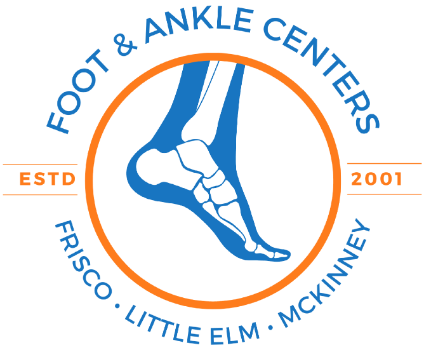Pediatric Foot Care for Congenital Issues | Foot & Ankle Centers
Sep 20, 2025 | By: Foot & Ankle Centers of Frisco, Little Elm, McKinney
Did you know that many babies are born with foot conditions that can affect their ability to walk or move comfortably? From flat feet to more complex issues like clubfoot, congenital foot disorders can vary in severity. Early diagnosis and treatment are key to helping your child avoid discomfort and complications as they grow. In this blog, we’ll explore the most common congenital foot disorders, their potential impact, and how seeking prompt care can help ensure your child’s feet develop properly.
What Are Congenital Foot Disorders?
Congenital foot disorders are conditions that a child is born with, affecting the structure, function, or movement of the feet and ankles. These issues can vary in severity, from mild cases that resolve on their own to more complex conditions that require medical intervention.
Some of the most common congenital foot disorders include:
-
Flat Feet: Also known as fallen arches, this condition occurs when the arch of the foot doesn’t develop properly. While often painless in children, it can cause issues like fatigue or discomfort as they grow.
-
Clubfoot (Talipes Equinovarus): A more severe condition where the foot is turned inward and downward, making it difficult for the child to walk properly.
-
Metatarsus Adductus: This condition causes the front part of the foot to curve inward, often looking like the child is walking on the sides of their feet.
Dr. Tavakoli, Dr. Knapp, and Dr. Treleven at Foot & Ankle Centers, with locations in Frisco, McKinney, and Little Elm, emphasize the importance of early treatment for congenital foot disorders, providing prompt, personalized care to ensure your child’s feet develop properly and avoid long-term complications.
Why Early Diagnosis Is Important
The earlier a congenital foot disorder is diagnosed, the better the chance for effective treatment. In many cases, these conditions can be managed with non-invasive methods like stretching exercises, physical therapy, and the use of custom orthotics. However, if left untreated, some conditions can lead to complications, including:
-
Decreased mobility: The condition may worsen as the child grows, limiting their ability to walk, run, or engage in normal activities.
-
Pain and discomfort: What may start as a mild issue can turn into chronic pain as the child matures.
-
Developmental delays: Walking and other motor skills may be delayed if the child struggles with foot deformities.
By identifying the issue early, our doctors at Foot & Ankle Centers can create a treatment plan that addresses the problem before it affects the child's long-term development.
Treatment Options for Congenital Foot Disorders
Treatment for congenital foot disorders depends on the severity and type of condition. Here are some treatments used by the expert team at Foot & Ankle Centers:
-
Stretching Exercises: For conditions like flat feet or metatarsus adductus, stretching and strengthening exercises may be sufficient to help the child’s foot develop properly.
-
Physical Therapy: A physical therapist can guide your child through specific exercises to improve mobility, strength, and flexibility in the feet and ankles.
-
Orthotics: Custom-made insoles or braces can help correct alignment issues, providing the necessary support for your child’s feet as they grow.
-
Casting: For conditions like clubfoot, a series of casts can be used to gradually correct the foot’s position.
-
Surgery: In more severe cases, such as with clubfoot or when conservative treatments have failed, surgical intervention may be required to correct the deformity.
How Our Experts Can Help
If your child has a congenital foot disorder or you suspect an issue, the expert team at Foot & Ankle Centers is here to help. Dr. Tavakoli, Dr. Knapp, and Dr. Treleven specialize in pediatric foot care and provide comprehensive diagnosis, treatment, and management at our Frisco, McKinney, and Little Elm locations. We’re dedicated to ensuring your child’s healthy feet for life.
Each treatment plan is tailored to your child’s needs, ranging from non-invasive options like physical therapy and orthotics to advanced treatments such as casting or surgery, ensuring the best outcomes for their mobility and quality of life.
Prevention and Long-Term Foot Health
While many congenital foot conditions can’t be prevented, early intervention is crucial to avoid unnecessary pain or developmental delays. With regular check-ups and ongoing care, most children with congenital foot disorders lead active, healthy lives. As they grow, continued monitoring and care are important, as adjustments may be needed during growth spurts. Supportive shoes and physical activities that strengthen the feet and legs are key to long-term foot health.
Taking Action for Your Child’s Foot Health
If you’ve noticed signs of a congenital foot disorder or if your child is having difficulty walking or standing, it’s crucial to seek professional care. Early diagnosis and treatment can make all the difference in ensuring your child’s feet develop properly and without complications.
Our team at Foot & Ankle Centers in Frisco, McKinney, and Little Elm, including Dr. Tavakoli, Dr. Knapp, and Dr. Treleven, are dedicated to providing personalized care to help your child move comfortably and confidently. Contact us to book your child's appointment today and take the first step toward ensuring their foot health for years to come.


Leave a comment
0 Comments